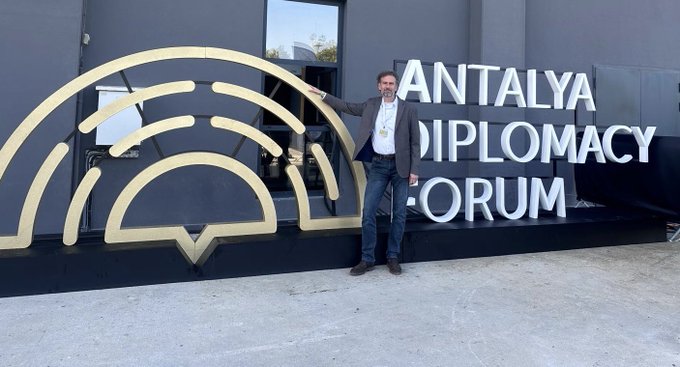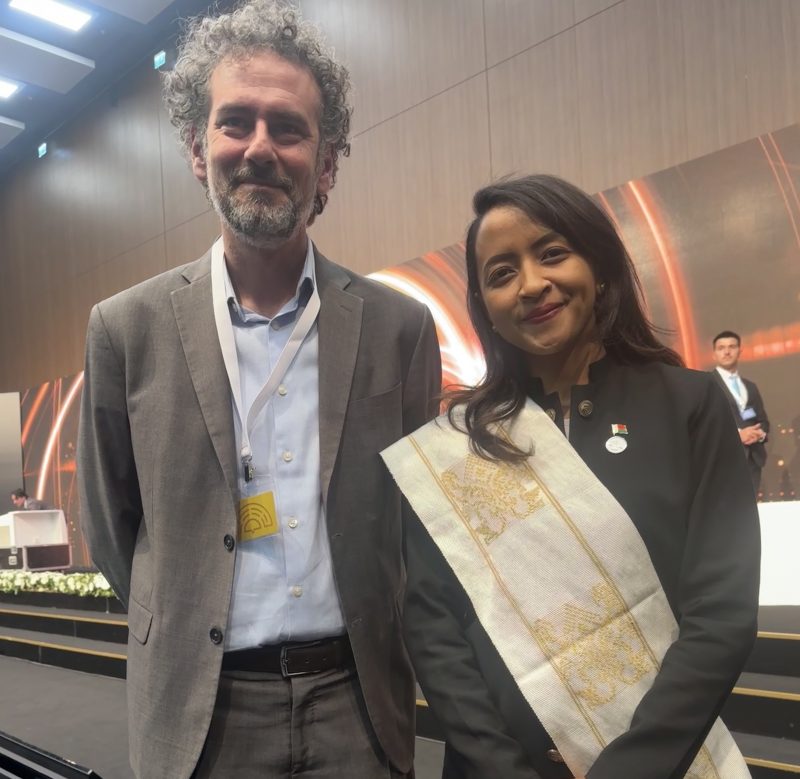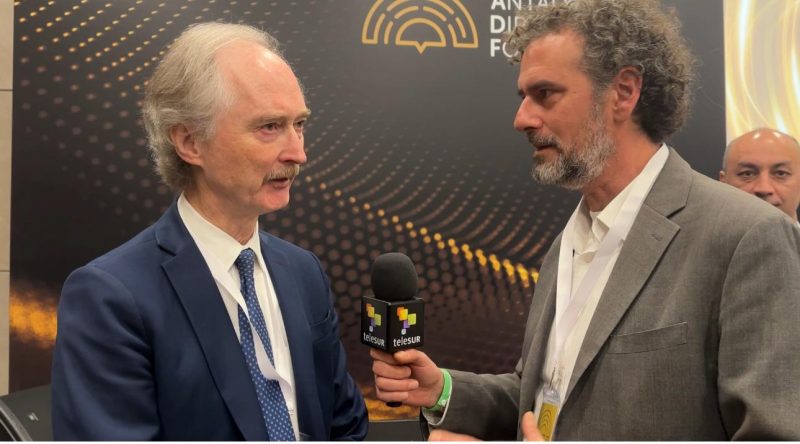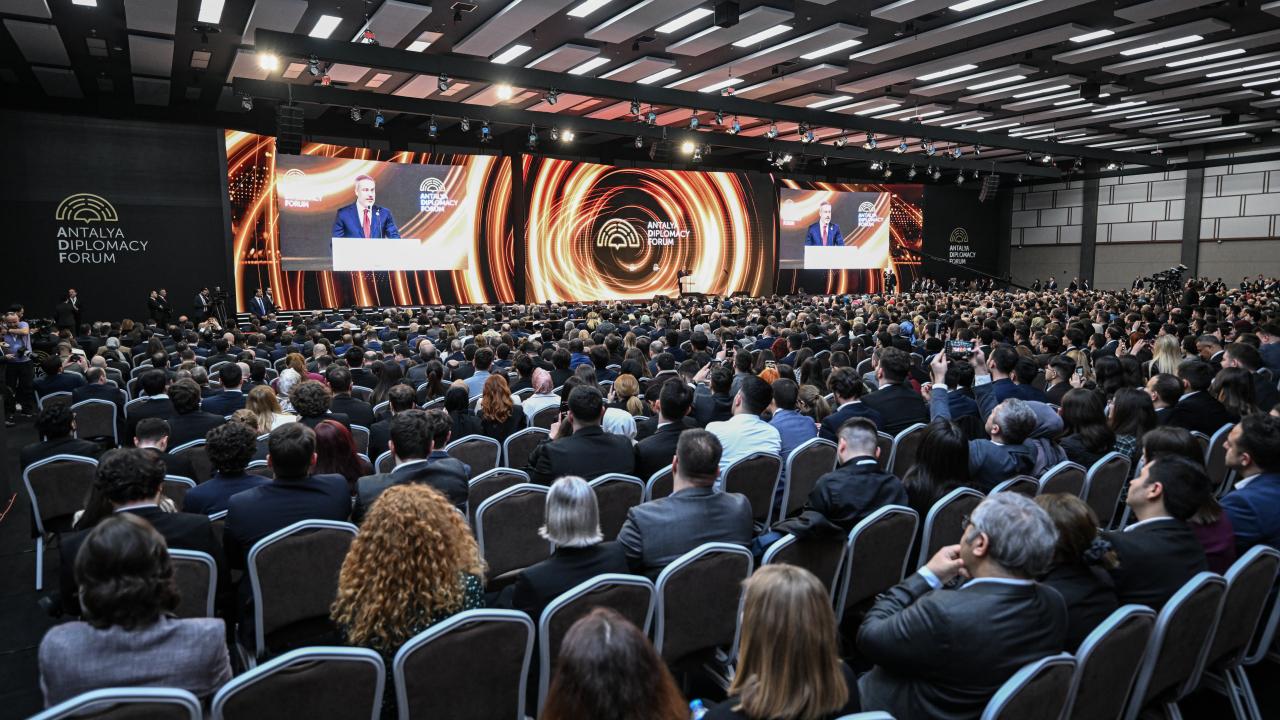Organized by the Turkish Foreign Ministry, the Antalya Diplomacy Forum in the southern Turkish city of Antalya has convened between March 1 and 3. Titled “Advancing Diplomacy in Times of Turmoil”, this convention was the third edition. In 2023, the forum was postponed due to the devastating earthquake in southern Türkiye on February 6.
The Turkish Foreign Minister Hakan Fidan provided numbers of the forum. 148 countries were represented on the forum, with 19 heads of state, 52 ministers of foreign affairs and 57 representatives of international organizations taking part in it. 4700 invited people took part.

The Forum organized around sessions regarding global developments, regional issues and thematic topics. The situation of the multilateral system, issues from the Middle East to Latin America as well as topics such as migration, food security, artificial intelligence were dealt with.
Besides the sessions, the delegations had numerous so-called bilaterals, using the forum as a meeting point with representatives from third countries.
Regional participation focused on what Turkish foreign policy calls “our geography at heart”, with participation from Central Asia over the Middle East and the Balkans to reach Africa and Latin America. Especially the African continent was represented by an astonishing number of heads of state and foreign ministers.
Europe on the other side was mainly represented by countries from the Balkans, while Western Europe could only count with small groups of participants, most of them former politicians. European politicians such as the OSCE Secretary General Helga Maria Schmid or Angelina Eichhorst, European External Service Managing Director at the European Union, participated in sessions connected directly to European topics.
No politicians from the United States and France attended the forum. The US was represented by the President of the Institute of Peace, a federal institution. NATO was represented by Scott W. Bray, Assistant Secretary General for Intelligence and Security.
While Sergei Lavrov, Russian Foreign Minister attended the forum, no official representative took part on behalf of China.
Reform of the UN-system
In his closing press conference, Fidan stated that several participants had criticized the existing multilateral system for being unjust and unequal. Indeed, especially representatives from the African continent targeted the UN Security Council and the veto powers of the 5 permanent members. The US veto regarding the ceasefire proposals in Gaza were harshly criticized.
The Global South versus NATO
The forum displayed a policy of balance: The session titled “Understanding the Global South” convened with participation of the South African and Brazilian Foreign Ministers, the Secretary General of D-8 and Jeffrey Sachs, a member of the UN network. All blamed NATO for is expansion to the east which caused the Ukraine crisis. “The Ukraine war will end when the NATO expansion ends”, Sachs stated.

Exactly next door, at the same time convened the session on “The Future of European Security Architecture”, with participation of OSCE and NATO representatives. NATO’s Deputy Secretary General Bray stated the “state-on-state-war has returned” and claimed Europe’s security was “tied to Ukraine”. The same session featured the Swiss Foreign Minister reporting on preparations for a peace conference and adding “we need Russia and the BRICS countries there”.
Fidan: Separate ceasefire and occupation in negotiations in Ukraine
Turkish Foreign Minister Fidan also touched about the conflict in Ukraine in his final press conference. Having held bilateral meetings with his Russian counterpart, Fidan said both sides had arrived at the end of possible military advances. The Turkish minister proposed “the issues of ceasefire and occupation should be dealt separately”, distancing himself thus from Ukrainian President Zelensky’s demand that the Russian occupation must end before a ceasefire.
Aware and trying to correct the implications of his statement, Fidan added this would “not mean recognizing annexation”.
The Turkish Foreign Minister also made a statement on Syria, announcing the need for “a closer framework to discuss the situation”. I asked the UN Special Envoy to Syria, Geir Pedersen, whether he would welcome rapprochement between Türkiye and Syria. “Good idea, for sure”, Pedersen responded, adding it needed to happen in the framework of the UN Resolution 2254 which demands a new constitution, a transitional government and new elections.
Fidan also emphasized this framework, specifically pointing out the refugee problem and the progress on the constitutional reform.

Conflict on Gaza: Fidan says “unilateral actions” possible
The contact group on Gaza also convened during the forum. After the normalization, Turkish and Egyptian foreign ministers sat side by side with their Palestinian counterpart.
But expectations about a new, strong alliance were not fulfilled, with all three representatives again repeating their previous statements and calling the “international community” to stop Israel.
On his final press conference, Fidan made a very indirect statement on the issue, saying that “many argue the time for waiting for permission has passed and the time for unilateral actions has come. I do share that approach”, he said, without specifying what these actions could be.
The Palestinian Foreign Minister Malki meanwhile said “we have all failed”, placing himself into that “international community”.
According to the Turkish Foreign Minister, the forum’s participants agreed on the “injustice and inequality” of the global order. Fidan said the forum had shown the need for communication and diplomacy for a global reform.
Actions speak louder than words, we shall conclude.
















Leave a Reply